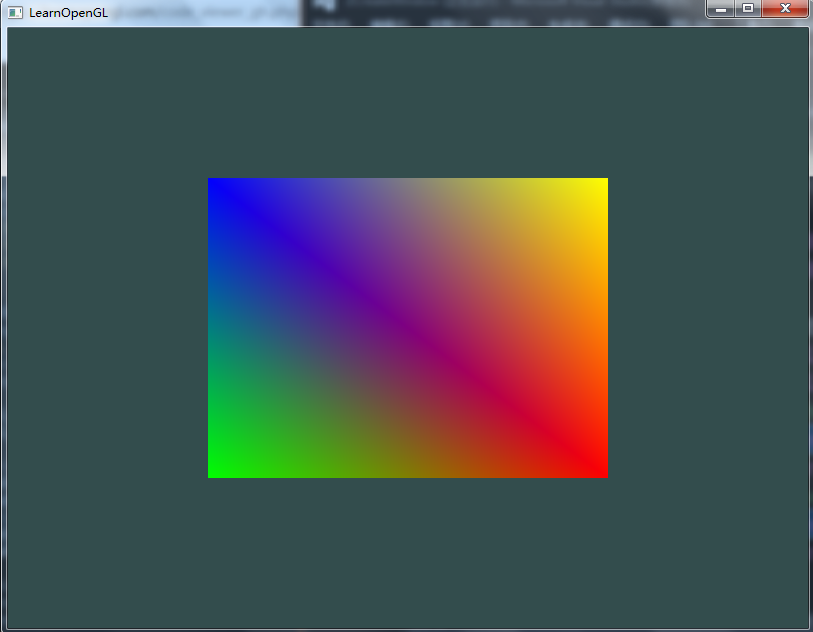Previous section On the shaders of OpenGL learning In this section, we will create a shader class and use the C + + file stream to read the contents of the shader.
I. create shader class
We can directly right-click the solution and select new class. This will automatically generate a. h and a. cpp file. We can also create a. h and. cpp file by ourselves. Then we define the member variables and member functions of the class in. h, and implement the function functions in. cpp.
1. Define class structure`
#pragma once
class Shader
{
public:
unsigned int ID; //Program ID
//Constructor reads and builds shaders
Shader(const GLchar *vertexPath, const GLchar * fragmentPath, const char* geometryPath = nullptr);
//Use (activate) the program
void use();
//uniform utility functions
void setBool(const std::string &name, bool value)const;
void setInt(const std::string &name, int value)const;
void setFloat(const std::string &name, float value)const;
private:
void checkCompileErrors(GLuint shader, std::string type);
};
2. Read from file
We implement function function function in. cpp file
#include <glad/glad.h>
#include<glm\glm.hpp>
#include<string>
#include<fstream>
#include<sstream>
#include<iostream>
#include "Shader.h"
Shader::Shader(const GLchar * vertexPath, const GLchar * fragmentPath, const char * geometryPath)
{
// 1. retrieve the vertex/fragment source code from filePath
std::string vertexCode;
std::string fragmentCode;
std::string geometryCode;
std::ifstream vShaderFile;
std::ifstream fShaderFile;
std::ifstream gShaderFile;
// ensure ifstream objects can throw exceptions:
vShaderFile.exceptions(std::ifstream::failbit | std::ifstream::badbit);
fShaderFile.exceptions(std::ifstream::failbit | std::ifstream::badbit);
gShaderFile.exceptions(std::ifstream::failbit | std::ifstream::badbit);
try
{
// open files
vShaderFile.open(vertexPath);
fShaderFile.open(fragmentPath);
std::stringstream vShaderStream, fShaderStream;
// read file's buffer contents into streams
vShaderStream << vShaderFile.rdbuf();
fShaderStream << fShaderFile.rdbuf();
// close file handlers
vShaderFile.close();
fShaderFile.close();
// convert stream into string
vertexCode = vShaderStream.str();
fragmentCode = fShaderStream.str();
// if geometry shader path is present, also load a geometry shader
if (geometryPath != nullptr)
{
gShaderFile.open(geometryPath);
std::stringstream gShaderStream;
gShaderStream << gShaderFile.rdbuf();
gShaderFile.close();
geometryCode = gShaderStream.str();
}
}
catch (std::ifstream::failure e)
{
std::cout << "ERROR::SHADER::FILE_NOT_SUCCESFULLY_READ" << std::endl;
}
const char* vShaderCode = vertexCode.c_str();
const char * fShaderCode = fragmentCode.c_str();
// 2. compile shaders
unsigned int vertex, fragment;
// vertex shader
vertex = glCreateShader(GL_VERTEX_SHADER);
glShaderSource(vertex, 1, &vShaderCode, NULL);
glCompileShader(vertex);
checkCompileErrors(vertex, "VERTEX");
// fragment Shader
fragment = glCreateShader(GL_FRAGMENT_SHADER);
glShaderSource(fragment, 1, &fShaderCode, NULL);
glCompileShader(fragment);
checkCompileErrors(fragment, "FRAGMENT");
// if geometry shader is given, compile geometry shader
unsigned int geometry;
if (geometryPath != nullptr)
{
const char * gShaderCode = geometryCode.c_str();
geometry = glCreateShader(GL_GEOMETRY_SHADER);
glShaderSource(geometry, 1, &gShaderCode, NULL);
glCompileShader(geometry);
checkCompileErrors(geometry, "GEOMETRY");
}
// shader Program
ID = glCreateProgram();
glAttachShader(ID, vertex);
glAttachShader(ID, fragment);
if (geometryPath != nullptr)
glAttachShader(ID, geometry);
glLinkProgram(ID);
checkCompileErrors(ID, "PROGRAM");
// delete the shaders as they're linked into our program now and no longer necessery
glDeleteShader(vertex);
glDeleteShader(fragment);
if (geometryPath != nullptr)
glDeleteShader(geometry);
}
void Shader::use()
{
glUseProgram(ID);
}
// utility uniform functions
// ------------------------------------------------------------------------
void Shader::setBool(const std::string &name, bool value) const
{
glUniform1i(glGetUniformLocation(ID, name.c_str()), (int)value);
}
// ------------------------------------------------------------------------
void Shader::setInt(const std::string &name, int value) const
{
glUniform1i(glGetUniformLocation(ID, name.c_str()), value);
}
// ------------------------------------------------------------------------
void Shader::setFloat(const std::string &name, float value) const
{
glUniform1f(glGetUniformLocation(ID, name.c_str()), value);
}
void Shader::checkCompileErrors(GLuint shader, std::string type)
{
GLint success;
GLchar infoLog[1024];
if (type != "PROGRAM")
{
glGetShaderiv(shader, GL_COMPILE_STATUS, &success);
if (!success)
{
glGetShaderInfoLog(shader, 1024, NULL, infoLog);
std::cout << "ERROR::SHADER_COMPILATION_ERROR of type: " << type << "\n" << infoLog << "\n -- --------------------------------------------------- -- " << std::endl;
}
}
else
{
glGetProgramiv(shader, GL_LINK_STATUS, &success);
if (!success)
{
glGetProgramInfoLog(shader, 1024, NULL, infoLog);
std::cout << "ERROR::PROGRAM_LINKING_ERROR of type: " << type << "\n" << infoLog << "\n -- --------------------------------------------------- -- " << std::endl;
}
}
}
2. Shader file
1.VertexSource.txt
#version 330 core
layout(location = 0) in vec3 position;
layout(location = 1) in vec3 aColor;
out vec3 ourColor;
void main(){
gl_Position = vec4(position.x, position.y, position.z, 1.0f);
ourColor = aColor;
}
2.fragmentSource.txt
#version 330 core
out vec4 FragColor;
in vec3 ourColor;
void main()
{
FragColor = vec4(ourColor, 1.0f);
}
III. main function
#include <glad/glad.h>
#include <GLFW/glfw3.h>
#include <iostream>
#include"Shader.h"
void framebuffer_size_callback(GLFWwindow* window, int width, int height);
void processInput(GLFWwindow *window);
// settings
const unsigned int SCR_WIDTH = 800;
const unsigned int SCR_HEIGHT = 600;
//const char *vertexShaderSource = "#version 330 core\n"
//"layout (location = 0) in vec3 aPos;\n"
//"layout (location = 1) in vec3 aColor;\n"
//"out vec3 ourColor;\n"
//"void main()\n"
//"{\n"
//" gl_Position = vec4(aPos, 1.0);\n"
//" ourColor = aColor;\n"
//"}\0";
//const char *fragmentShaderSource = "#version 330 core\n"
//"out vec4 FragColor;\n"
//"in vec3 ourColor;\n"
//"void main()\n"
//"{\n"
//" FragColor = vec4(ourColor, 1.0f);\n"
//"}\n\0";
int main()
{
// glfw: initialize and configure
// ------------------------------
glfwInit();
glfwWindowHint(GLFW_CONTEXT_VERSION_MAJOR, 3);
glfwWindowHint(GLFW_CONTEXT_VERSION_MINOR, 3);
glfwWindowHint(GLFW_OPENGL_PROFILE, GLFW_OPENGL_CORE_PROFILE);
#ifdef __APPLE__
glfwWindowHint(GLFW_OPENGL_FORWARD_COMPAT, GL_TRUE); // uncomment this statement to fix compilation on OS X
#endif
// glfw window creation
// --------------------
GLFWwindow* window = glfwCreateWindow(SCR_WIDTH, SCR_HEIGHT, "LearnOpenGL", NULL, NULL);
if (window == NULL)
{
std::cout << "Failed to create GLFW window" << std::endl;
glfwTerminate();
return -1;
}
glfwMakeContextCurrent(window);
glfwSetFramebufferSizeCallback(window, framebuffer_size_callback);
// glad: load all OpenGL function pointers
// ---------------------------------------
if (!gladLoadGLLoader((GLADloadproc)glfwGetProcAddress))
{
std::cout << "Failed to initialize GLAD" << std::endl;
return -1;
}
Shader ourShader("VertexSource.txt", "fragmentSource.txt");
// set up vertex data (and buffer(s)) and configure vertex attributes
// ------------------------------------------------------------------
float vertices[] = {
// positions // colors
0.5f, -0.5f, 0.0f, 1.0f, 0.0f, 0.0f, // bottom right
-0.5f, -0.5f, 0.0f, 0.0f, 1.0f, 0.0f, // bottom left
-0.5f, 0.5f, 0.0f, 0.0f, 0.0f, 1.0f, // top
0.5f, 0.5f, 0.0f, 1.0f,1.0f,0.0f
};
unsigned int indices[] = { // Note that the index starts from 0!
0, 3, 2, // First triangle
0, 2, 1 // Second triangle
};
unsigned int VBO, VAO, EBO;
glGenVertexArrays(1, &VAO);
glGenBuffers(1, &VBO);
// bind the Vertex Array Object first, then bind and set vertex buffer(s), and then configure vertex attributes(s).
glBindVertexArray(VAO);
glBindBuffer(GL_ARRAY_BUFFER, VBO);
glBufferData(GL_ARRAY_BUFFER, sizeof(vertices), vertices, GL_STATIC_DRAW);
glGenBuffers(1, &EBO);
glBindBuffer(GL_ELEMENT_ARRAY_BUFFER, EBO);
glBufferData(GL_ELEMENT_ARRAY_BUFFER, sizeof(indices), indices, GL_STATIC_DRAW);
// position attribute
glVertexAttribPointer(0, 3, GL_FLOAT, GL_FALSE, 6 * sizeof(float), (void*)0);
glEnableVertexAttribArray(0);
//// color attribute
glVertexAttribPointer(1, 3, GL_FLOAT, GL_FALSE, 6 * sizeof(float), (void*)(3 * sizeof(float)));
glEnableVertexAttribArray(1);
// render loop
// -----------
while (!glfwWindowShouldClose(window))
{
// input
// -----
processInput(window);
// render
// ------
glClearColor(0.2f, 0.3f, 0.3f, 1.0f);
glClear(GL_COLOR_BUFFER_BIT);
// render the triangle
ourShader.use();
glBindVertexArray(VAO);
glDrawElements(GL_TRIANGLES, 6, GL_UNSIGNED_INT, 0);
glBindVertexArray(0);
// glfw: swap buffers and poll IO events (keys pressed/released, mouse moved etc.)
// -------------------------------------------------------------------------------
glfwSwapBuffers(window);
glfwPollEvents();
}
// optional: de-allocate all resources once they've outlived their purpose:
// ------------------------------------------------------------------------
glDeleteVertexArrays(1, &VAO);
glDeleteBuffers(1, &VBO);
// glfw: terminate, clearing all previously allocated GLFW resources.
// ------------------------------------------------------------------
glfwTerminate();
return 0;
}
// process all input: query GLFW whether relevant keys are pressed/released this frame and react accordingly
// ---------------------------------------------------------------------------------------------------------
void processInput(GLFWwindow *window)
{
if (glfwGetKey(window, GLFW_KEY_ESCAPE) == GLFW_PRESS)
glfwSetWindowShouldClose(window, true);
}
// glfw: whenever the window size changed (by OS or user resize) this callback function executes
// ---------------------------------------------------------------------------------------------
void framebuffer_size_callback(GLFWwindow* window, int width, int height)
{
// make sure the viewport matches the new window dimensions; note that width and
// height will be significantly larger than specified on retina displays.
glViewport(0, 0, width, height);
}
IV. results

Welcome everyone to add my WeChat public address.
There will be more knowledge about opengl, 3D rendering and artificial intelligence here!